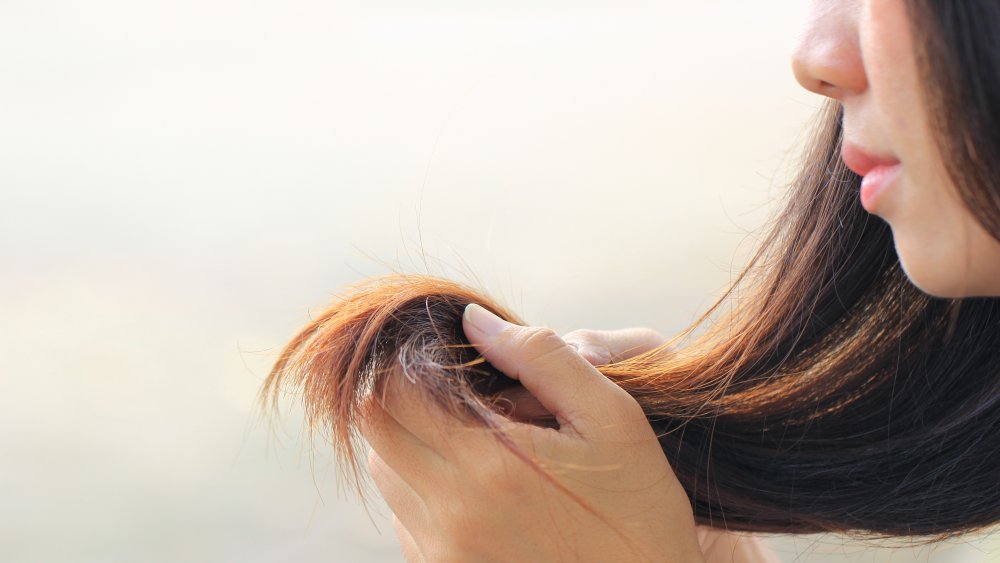Myths About Split Ends You Should Stop Believing
You are not a hair commercial, so stop believing in the fairy tale they tell. Your hair is not somehow less luscious, shiny, and perfect than it should be. Got split ends? That's okay. Even Blake Lively, with her Pantene-perfect locks, does (via Allure). Anyone can get them. And anyone can deal with them with the right information.
It turns out that whether your hair is prone to split has everything to do with the shape of your strands (via Be Beautiful). If you've got round hair strands, you're in luck. Your hair might not split as easily. If they're flatter, you're not as lucky. And if they're flat and long, you're probably stuck with split ends the same way some people are stuck with bacne. That's because split ends are most often caused by dryness, and long hair is more prone to it. Just ask colorist Matt Rez, who told HelloGiggles, "The longer the hair ... the harder it is for the natural scalp oils to run down and keep it from drying out."
Whatever you do, when you get split ends, don't pick them off. All you'll succeed in doing is weakening the strand of hair, and encouraging it to split again. And before you go trying other quick fixes, it's important to understand what split ends are and how to handle them. Here are some myths we've debunked about this beauty bugaboo.
Straight hair is more prone to split ends
Do you think you're agonizing over split ends more than your friends because you're stuck with straight hair and theirs is wavy or curly? Think again. Your split ends just might be more noticeable because your hair is straight. They are almost definitely more noticeable if your hair is straight and dark (via Bustle). If you've got, light curly hair, on the other hand, your split ends might go relatively unnoticed.
That doesn't mean they're not present. Curls, as Rez told Hello Giggles, are naturally dryer — and thus more prone to splitting — than straight locks. This, of course, makes sense. If the health of your hair depends on natural oils migrating down to moisturize individual strands, straight hairs are the equivalent of mini-toboggan runs. Curly hair, on the other hand, makes the oil hike up and down mini-mountains before reaching (or not reaching) its destination.
It's worth, of course, differentiating between curly and frizzy hair. Curly hair is not necessarily frizzy hair, and frizzy hair and split ends are not the same things. Frizzy hair is all about texture. While you can tame curly hair with split ends by cutting them, you'll have frizzy hair whether or not your ends or split or not (via Vici Salon & Spa). To de-frizz, you'll need to invest in a different set of products.
Split ends can't be prevented
You can add all the oils you want to your hair to keep the tips of your hair moisturized. But split ends are a bit like the Humpty Dumpties of the beauty world. Nothing is going to put them together again (via Allure). When your end is split, you've done permanent damage to your hair's outermost layer. End of story.
However, that doesn't mean you can't slow down the breakage and prevent split ends. While oils and other hair moisturizers won't turn back the hands of time, they can help a great deal. As hairstylist Jordan Garret told Women's Health, if you've got split ends, you can go ahead and use products that "[slow] down the rate at which your hair splits." Conditioning and hair hydration products will "keep the splits along the hair shaft from causing breakage," says Rez (via Hello Giggles). They may be worth a try, while you work up the courage and find the time to opt for a more permanent solution: the cut.
A trim is all you need to get rid of split ends
Are you really serious about getting rid of your split ends? We're talking serious the way that Prince Harry was serious enough about Meghan Markle to split from the royal ramily? Because that's the kind of commitment you might need, depending on the amount of damage. If you catch them early, a trim might be all you need. But some hair doesn't just split at the ends. When splits happen higher up on the hair shaft, then cutting the tips of your hair off is not going to do you any good (via Vici Salon & Spa). In these, more severe cases, your hairstylist will probably recommend cutting more.
Last, but not least, if you're considering chopping off your offending hairs yourself, do it right. Make sure you're in possession of professional hair cutting scissors (via Women's Health). The scissors you have stashed away in your kitchen drawer may do more harm than good. The blunter the scissor, the more frayed the cut. The more frayed the cut, the more split ends you're likely to develop.



